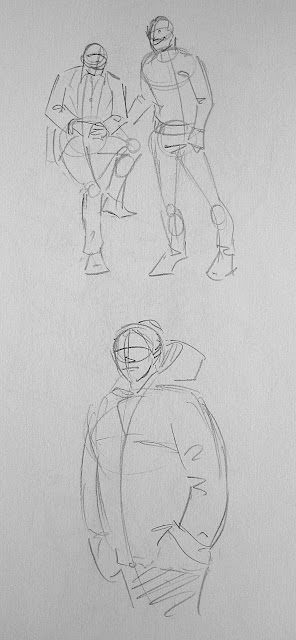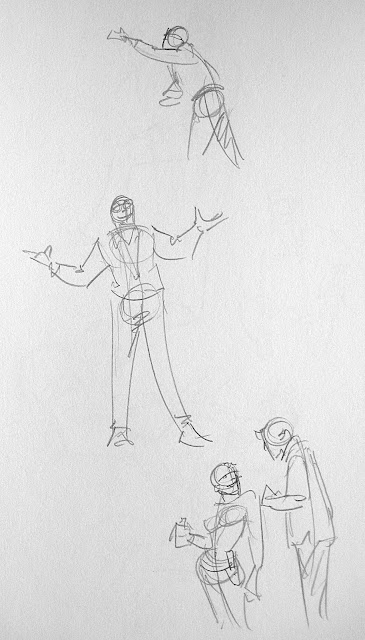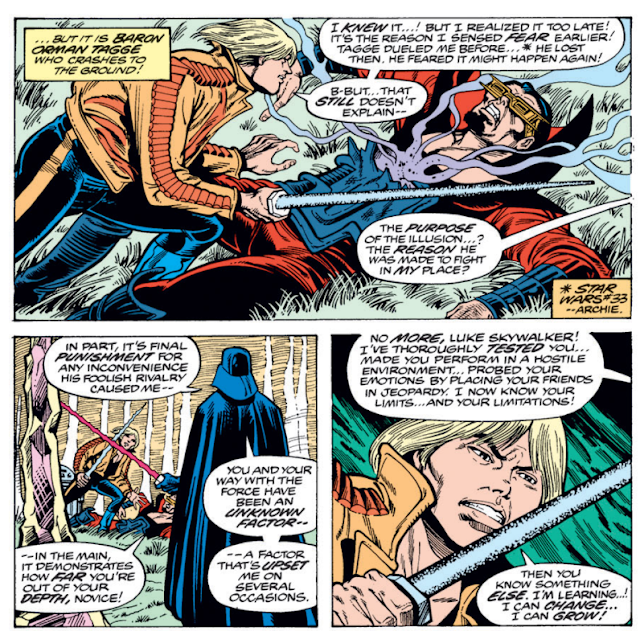Jorge's playground
Saturday, February 22, 2020
Wednesday, January 1, 2020
My Love Affair with Comic Books – Part 4
Part 1 is here.
Part 2 is here.
Part 3 is here.
Part 2 is here.
Part 3 is here.
The release of Star Wars in the summer of 1977 had a profound impact on my comic
book reading habits. I was ten years old at the time. (The movie itself of
course blew my mind and opened up my world to all sorts of exciting
possibilities—but that’s a subject for a future blog post.)
The Marvel Comics six-issue adaptation of the
film was released in various formats, taking full advantage of the movie’s
meteoric rise to pupularity.
My first foray into the Star Wars comics was by
way of Marvel’s two-volume Special Editions. These over-sized 10” x 14” books were
real gems.
One of the things that is so endearing about
writer Roy Thomas’ adaptation is how much it reads like a Marvel Comics-style
version of the story and not just a straightforward re-telling of the film.
Art is by Howard Chaykin, with Steve Leialoha
on inks for issues #2 thru 5, and Rick Hoberg and Bill Wray on issue #6.
Another cool thing about the comic book
adaptation is that it included some scenes that had been cut from the film—such
as Luke’s conversation with childhood friends Biggs Darklighter and Fixer and
Cammie.
Fixer and Cammie would make a brief return
appearance in issue #31.
Another cut scene depicted Han Solo’s encounter
with a noticeably different looking Jabba the Hutt than the one we would be
introduced to years later in Return of
the Jedi. This humanoid version would return in issue #28 and then briefly
in issue #37 to help set up the events in The
Empire Strikes Back.
I later picked up the first six issues at
either Zayre or Kmart, where they sold comics in three-issue bagged multi-packs
for 99¢ a bag.
After its initial print run the adaptation went
on to sell over a million copies by way of reprints, helping Marvel climb out
of the deep financial troubles it was experiencing in the 1970’s.
Of course I knew none of this at the time. I
was busy immersing myself in all things Star Wars—trading cards, Burger King
glasses, Artoo Detoo cookie jar, bed sheets, etc.
Incidentally, the glasses and cookie jar may be
long gone—but the trading cards and bed sheets remain in my collection.
The pulse-pounding ad in the back of the second
Marvel Special Edition tantalized readers with a sneak-peak at the cover to
issue #7, which would continue the Star Wars saga with all-new original stories.
At the time, this was a huge deal. A second
Star Wars film had yet to be officially announced, and the publication of Alan
Dean Foster’s Splinter Of the Mind’s Eye
(the first full-length Star Wars novel with an original storyline published
after the release of the original film) was still a ways away.
The Star Wars universe was in its infancy. There
was no episode number or A New Hope
title in the opening crawl. No Emperor. No Yoda. No Vader/Anakin revelation. The
mythology was still fresh and new and largely unexplored—with fans clamoring
for more, waiting with bated breath for every new reveal.
Looking back, it was the best of times to be a
Star Wars fan. A far cry from today’s toxic fandom.
My excitement was palpable when I finally came
across Marvel’s next batch of issues. I picked them up by way of two multi-packs.
One contained issues #7 thru 9, and the other issues #10 thru 12. Quite the
treasure trove!
Keep in mind that I had no idea of the
existence of comic book stores, so my exposure to comics was limited to what I
came across in convenience store spinner racks, supermarket checkout stands, or
those three-issue bagged multi-packs from Zaire and Kmart—which became my
gateway to the monthly Star Wars comics.
Those first issues that followed the movie
adaptation are a little rough around the edges, but still a helluva lot of fun.
Roy Thomas opted to focus on Han Solo and
Chewbacca, who were arguably two of the most popular characters from the film. What
followed was basically a retooled re-telling of the 1960 film The Magnificent Seven.
Issues #8 thru 10 were graced with Tom Palmer’s
luscious inks. Palmer would return for a long run in the post-Empire era.
Issue #11 signaled a change in creative teams,
with Archie Goodwin taking over the writing reins and Carmine Infantino handling
the pencil art. Inks were by Terry Austin of X-Men fame.
Picking up on story threads planted during
Roy’s run, Archie brought back space pirates Crimson Jack and Jolli (introduced
in issue #7) and fleshed out their characters. They proved to be great foils
for Han and Leia. The transition is seamless, building towards the reunion of
the Star Warriors in issue #14.
By this point I’d become savvy enough to want
to continue to pick up the Star Wars books as they were being released on a
monthly basis. But much to my chagrin I missed issue #13, which promised a
confrontation between Luke and an enraged Chewbacca, who mistakenly believed
that Luke was responsible for Han’s death.
I stumbled across issue #14 at a 7-Eleven. The
issue reunited the main cast for the first time since issue #7, bringing the
Drexel Dragon Lords water world saga to a satisfying conclusion.
I picked up issue #15 from a local bookstore
called Adolph’s. Such a cool cover! This issue was an epilogue of sorts to the
previous issue, wrapping up lingering plot points remaining from the storyline
begun by Archie back in issue #11. Crimson Jack and Jolli meet their untimely
deaths here—with Jolli making the ultimate sacrifice to save Han’s life.
Issue #13 remained hard to find. As did any other
new issues.
It wasn’t until several months later that I
discovered the existence of comic book stores. Thanks to the good old fashioned
Yellow Pages I was able to find two local stores in Miami—A&M Comics (the
oldest comics shop in Miami, still there to this day) and Sunshine Comics, both
conveniently located just a few blocks away from each other.
Needless to say, I was like a kid in the
proverbial candy store.
Issues #22 and 23 were on the racks alongside
other new releases. I snapped those up and scoured the back issue bins for the
past issues I’d missed—including the elusive issue #13, which featured a cover
drawn by John Byrne and Terry Austin, the fan-favorite art team who’d brought
the Uncanny X-Men book to new heights of popularity.
I also picked up issues #16 thru 20 that day.
Issue #21, which featured Darth Vader’s first post-movie appearance in the
comics, was in high demand and had sold out. Despite my disappointment from missing
what was clearly a milestone issue in the series, it had been a successful
haul, exposing me to a world (entire stores devoted to selling comics!) I never
knew existed.
Little wonder that shortly afterwards I would
expand my comic book buying habits to include more books from Marvel as well as
DC—a hobby that would continue through my teenage years and carry on through my
adult life.
I’ll dive into how those early days played out
in the next and final installment of My
Love Affair with Comic Books. Spoiler alert: Forty-plus years later I’m
still collecting comics.
Issue #16 is unique for several reasons.
The main protagonist is Valance the Hunter,
brainchild of writer Archie Goodwin. Bursting with attitude, the droid-hating
Valance is a memorable addition to the Star Wars mythos.
This was artist Walt Simonson’s first foray
into the Star Wars universe. He would return as penciler for issue 49 and then
join with writer David Michelinie for an acclaimed run in issues 51 thru 66
during the series’ post-Empire
period. He was also the cover artist on Star
Wars Annual #1 and contributed inks over Al Williamson’s pencils in the
landmark 50th issue.
Issue #16 was the first and only issue in the
series’ long one hundred and seven issue history to not feature any of main the
characters from the films—a pretty bold move for a series so early in its run.
Luke and the gang make only a brief appearance in a series of flashback
vignettes depicting the Hunter’s musings.
Armed with a compelling, tragic backstory and a
cool arsenal, the character proved popular enough to make two return
appearances later in the series.
Issue #17 is a fun flashback story telling an
untold tale from Luke’s past life on Tatooine. Uncle Owen and Aunt Beru make an
appearance, along with Luke’s childhood friend Biggs.
The story is notable in that we get to see
Luke’s T-16 Skyhopper in action. The Skyhopper was first seen briefly in A New Hope. (Luke’s playing with a model
of the ship in the screenshot below, while the actual Skyhopper can be seen
parked outside the door, screen right of See Threepio.)
Issues #18 thru 23 kicked off a multi-part epic
filled with political intrigue and Imperial skullduggery aboard a huge space
station gambling casino known as the Wheel.
Gene Day and Bob Wiacek took over the inks as
of issue #18, each working on alternating issues. I believe this was partly due
to the demands of the Star Wars Weekly
reprint series being published in the UK.
By the time Star
Wars issues #24 and 25 had come out on the stands I’d gotten ahold of the Dark
Lord’s return in issue #21. It did not disappoint, hinting at a future
confrontation between Valance the Hunter and Darth Vader.
Issues #25 and 26 introduced villain Baron
Orman Tagge into the mix.
Orman is the elder brother of Imperial
Commander Cassio Tagge, whom we met on the ill-fated Death Star in A New Hope. Cassio served as the battle
station’s Chief of Military Operations.
Other Tagge family members (brothers Silas and
Ulric and their deadly sister Domina) would appear in future issues to plague
our heroes.
Issue #27 saw the return of Valance the Hunter
as he tracks down Luke Skywalker, intent on killing him. The encounter leaves
Valance a changed man, forcing him to re-evaluate his hatred of droids.
Issue #29 is one of my favorite issues of the
entire series. It features an epic showdown between Darth Vader and Valance the
Hunter in which Valance makes the ultimate sacrifice to keep Vader from
discovering the identity of the man who destroyed the Death Star.
All the while I was watching the second episode
of The Mandalorian I couldn’t help
but think back to issue #32 in which Han, Luke and Chewie team up with the
Jawas against the Empire.
Issue #33 is special to me because the letters
column featured my first-ever letter published in a Marvel comic—gushing with
praise for issue #29. I wish I could reprint it here, but I don’t have access
to my old comics at the moment.
Issue #38 was drawn by the amazing Michael
Golden, whose work I loved on Batman
and The Micronauts. The beautiful art
speaks for itself.
Unlike Roy Thomas, Archie Goodwin stuck to a
more straightforward approach for his adaptation of The Empire Strikes Back in issues #39 thru 44
It featured gorgeous artwork by the legendary
Al Williamson and Carlos Garzon.
These first 44 issues easily remain some of my
favorite comic books of all time. I’ve re-read those issues more than any other
comics in my collection. I never get tired of them, and even just writing about
them now makes me want to re-visit them again.
Issue #50 was Archie Goodwin’s swan song as
writer on the monthly series.
The post-Empire
period proved tricky because of the plight of Han Solo. Left frozen in
carbonite at the end of The Empire
Strikes Back, the popular character was unavailable for use.
The new creative team of writer David
Michelinie and artists Walt Simonson and Tom Palmer more than rose to the
challenge.
One of their biggest contributions to the Star
Wars universe was a character named Shira Brie. Introduced as a capable Rebel
pilot and possible love interest for Luke, she was later revealed to be an
agent of the Empire.
Writer Jo Duffy would pick up the writing reins
after Michelinie’s departure, aided by artists Ron Frenz and Tom Palmer, and
later Cynthia Martin. Jo had a great handle on the characters, injecting some
humor into the proceedings.
Archie Goodwin and Al Williamson would return
for the adaptation of Return of the Jedi,
which was published as a separate mini-series.
Han Solo’s return to the monthly book was
chronicled in issue #81’s “Jawas of Doom”—an issue which came to mind while
watching The Mandalorian’s second
episode, much like did issue #32’s “The Jawa Express”.
Jo Duffy continued to introduce cool new
concepts and alien races into the mix, including a mysterious new villain named
Lumiya—later revealed to be Shira Brie.
All in all, the series was a solid read for its
entire run from beginning to end. It still holds up today.
A few years ago Marvel reprinted all 107 issues
in beautiful Omnibus hardcover books. They are highly recommended.
Subscribe to:
Comments (Atom)























































































































































































